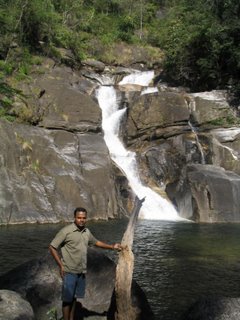Dialer tune to convey "I'm driving"

Some background on where I got this idea. We went to Kallar during our Trivandrum stay. Kallar is a tourist spot about 50km from Trivandrum on the way to the Ponmudi hillstation. Once you reach the spot, you need to take a hike of about 1 km to see the Meenmutti water walls (see pic). The hike goes through a really dense forest; you can even encounter wild elephants. We took a guide and the place is very pristine. I think that is a good outcome of lack of development; nature still not robbed of its beauty.
Okay, back to the geeky stuff. We had hired a car from Trivandrum and the drive up wasn't easy due to the curvy roads and bad road conditions. The roads were damaged quite a bit due to the recent heavy monsoon. Our driver was a skilled man; but he was constantly getting phone calls on his mobile. Being a passenger, I wasn't comfortable seeing him manage those difficult curves with one hand. I thought of ways to reduce the hazard of cellphone usage while driving.
There are legal steps like mandating hands free usage while driving. I think quite a few states (like New York) already implement such steps. I believe the serious risk is not that you don't have an additional hand on your wheel; but it's about mental diversion. Your brain is being distracted while you are talking. And to compound the issue, your caller doesn't know that. Usually a fellow passenger in the car doesn't distract you at difficult driving conditions, because he/she can see the surroundings. But that is not the case with a phone caller. The caller can tell something really exciting (and hence very distracting)at exactly the same time when your car needs your full concentration. So how about letting the caller know before you pick up the phone, that you are driving? This can help the caller avoid the call altogether or at least keep it really short.
So the phone provides a feature, like a profile selection, to say "you are driving". You select that profile before you start your drive. Any body who calls you will hear a message like "I'm driving now.." along with the normal ring tone. You can still pick up the call; but we at least we know the caller isn't going to keep you distracted for too long.
BTW after a week from our trip, I did read a post in slashdot elaborating future phone features very similar to the above. But it was more fancy -- like detecting that you are in a theater (thru' GPS say) and automatically switching to a vibrate mode.

